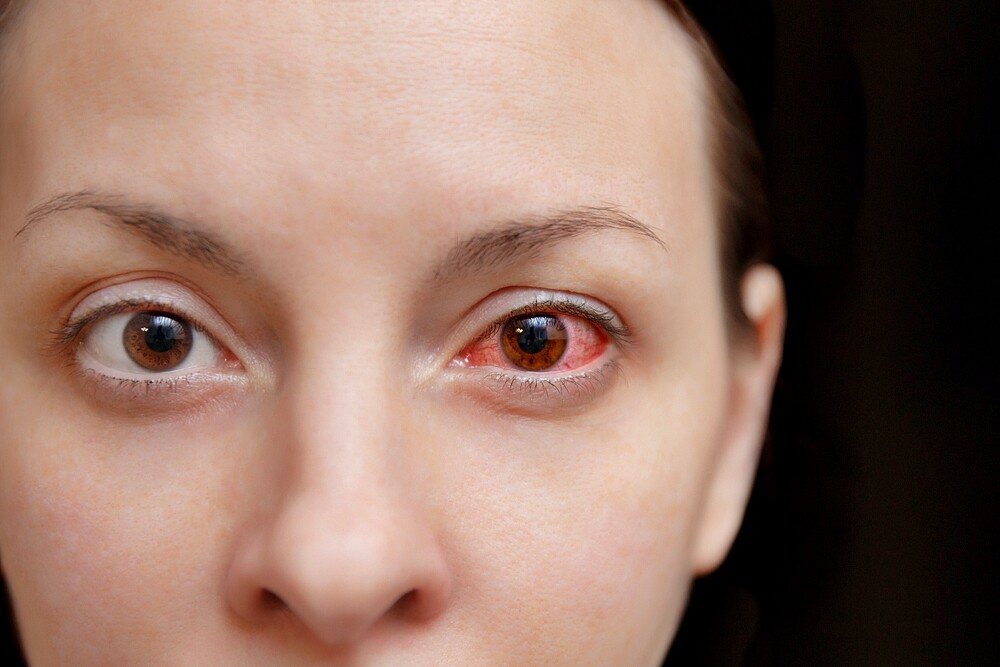The eye is sensitive, reddened and itches: conjunctivitis (pink eye) is extremely unpleasant for those affected. We will tell you here which home remedies provide relief.
Conjunctivitis: Home remedies or doctor?
Conjunctivitis can have various causes, but it is important to distinguish between infectious and non-infectious inflammation. Which causes are possible:
Infectious triggers
- Various bacterial pathogens, such as pneumococci or staphylococci, can cause conjunctivitis.
- Chlamydia is a sexually transmitted disease, but the bacteria can enter the eye through the hands or be transmitted through a shared bathroom, for example. If chlamydia is the trigger, the partner must also be treated!
- Viruses, such as adenoviruses or herpes viruses, can also cause conjunctivitis. Conjunctivitis caused by adenoviruses often occurs in conjunction with a cold.
Non-infectious triggers
- An allergic conjunctivitis can occur in connection with hay fever, for example. Rhinoconjunctivitis is an allergic inflammation of the nasal mucosa and the disease of the conjunctiva. An allergy to animal hair, house dust mites or moulds can also be the cause.
- External stimuli such as dust, smoke or dry air can irritate the mucous membranes so much that they become inflamed. And: chlorinated water can also be a cause.
Caution is required in case of infection, because infectious conjunctivitis is contagious! The pathogens can infect other people via hands, towels or even by speaking (droplet infection).
In any case, a doctor or ophthalmologist must be consulted, who can determine the cause and further treatment options. Among other things, the diagnosis is important to prevent further infections.
Symptoms
A conjunctivitis in the eye is unpleasant for everyone affected and is noticeable by the following symptoms, for example:
- Redness
- Frequent blinking
- Watery eye
- Swelling of the conjunctiva and eyelid
- Itching
- Burning
- Foreign body sensation
- Glare sensitivity
- White-yellowish eye secretion (for bacterial inflammation)
Treatment
In case of an infectious inflammation, the doctor prescribes appropriate medication, e.g. ointments with cortisone or antibiotics. After two to three days there should already be an improvement, but use should be continued according to the doctor’s recommendation. In the case of allergic conjunctivitis, antihistamines can relieve the symptoms. In the case of an allergy, of course, it is also important to avoid the allergens if possible.
What to do for conjunctivitis: Home remedies that bring relief
In the case of a slight conjunctivitis and in consultation with the treating doctor, some home remedies are also suitable for relief:
Quark wrap
A quark wrap can help against the swelling of the eyelid. You will need a clean, moist cotton cloth for this. Put some curd in the middle and fold all the ends together at the top. Now place the curd wrap on the closed eye for about 20 minutes. The cooling is pleasant and helps to reduce the swelling. But: do not put the curd directly on the eyelid! Otherwise the curd can get into the eye and will start to dry out over time.
Compresses
A compress is also a suitable household remedy. Calendula, for example, which can alleviate the itching of conjunctivitis, is a suitable household remedy. To do this, pour hot water over marigolds and leave them to infuse for at least 15 minutes. If the water is lukewarm, dip a fresh compress in it and then place it on the closed eye.
Eyebright
Eyebright (Euphrasia officinalis) is not registered as a herbal medicinal product in Germany, but is often used in folk medicine for conjunctivitis – and the name says it all. This is because eyebright is said to have analgesic, antibacterial and anti-inflammatory properties. You can also use eyebright as a compress, alternatively you can get eye drops from the pharmacy.

